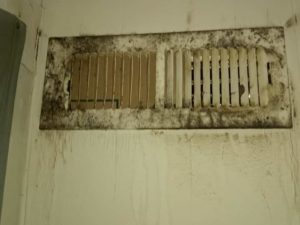
In 2016, after being priced out of Nashville, Nicole Burgeson and her family moved into a house in Shelbyville, a city in Bedford County.
“It was an older home, we thought, you know all it needed was a slap of paint, the carpets cleaned and it would be all right,” she says.
She soon discovered the house had mold, bedbugs, rats that chewed through the walls, and cockroaches breeding in the cupboards.
“Also our kitchen floor fell in. I fell in with it. My leg did,” she quips.
She was paying $150 a week in rent, later upped to $165. But the house seemed to be falling apart by the day. The walls were buckling. The electricity would flicker on and off. The plumbing malfunctioned.
“When I would call I would get told, ‘OK, it’s on the list’,” she says. “That’s the famous saying.”
Burgeson is part of a growing number of residents moving to rural areas like Shelbyville from Nashville, Murfreesboro and other Middle Tennessee counties. But they’re discovering that these places have far fewer protections in place for renters.
So with housing in high demand in one rural county, one local activist group says it’s time to hold landlords more accountable.

At Nicole Burgeson’s home, she said mold was rampant. Photo courtesy of Nicole Burgeson.
Bedbugs, Mold, Pests
Burgeson is a part of small group of local residents called the Bedford County Listening Project. For the past 10 months, they’ve been gathering information on renters in the rural county. They knocked on hundreds of doors, held meetings and distributed surveys — and the final report, released last week, is scathing.
Of the 230 renters surveyed, almost all said they struggled to find affordable housing in the area. The vast majority had issues with bedbugs, pests, mold, doors that didn’t lock, toilets that didn’t flush. More than a third said landlords never fixed the problems or even threatened eviction when they asked for repairs.
In Burgeson’s case, the landlord was a man named Robert Allison. He owns more than 100 properties in the county, under a company Peacock Realty Group. According to the Listening Project, a third of respondents said they lived in properties owned by Allison.
Allison denies the allegations made by Burgeson about the conditions of her former home. In a statement, he tells WPLN News: “Peacock Realty Group supports the efforts of these citizens to improve their community through peaceful protest and the free exchange of ideas. We hope to have the opportunity to collaborate with The Bedford County Listening Project and our local government officials on these excellent ideas.
“We encourage any tenants anywhere who feel they aren’t getting treated fairly to contact The Legal Aid Society to get free legal representation so that their side of the story can be communicated effectively in court.”
 Photo courtesy of Nicole Burgeson
Photo courtesy of Nicole Burgeson Nicole Burgeson said the walls were buckling at her rental home.
Few Protections Under The Law
But the fact is, renters have little power in a county like Bedford. And that’s because it has too few residents to be protected by Tennessee’s Uniform Residential Landlord Tenant Act, or URLTA.
The law only applies to counties with a population of 75,000 or more. According to the last census, Bedford County had just 45,000 people.
As it stands, in a rural county like Bedford, “there are no set guidelines, there are no set laws,” says Tamia Stanton, another member of the group who lived in a home with similar issues to Burgeson’s.
Under URLTA, for example, if an essential repair wasn’t getting done, a tenant could do it themselves and deduct that cost from rent.
“Currently, you’re not able to do that here in Bedford County,” Stanton says.
In the meantime, The Bedford County Listening project is lobbying county and state officials to adopt URLTA, as more and more people migrate out of places with rental protections.
‘If You Stay, You Pay’
This lack of protections played out during a recent hearing in Bedford County’s eviction court, where Tyler McCrary stood before Judge Charles Rich.
McCrary was being evicted for owing almost $2,000 in unpaid rent. He’d stopped paying the $700 monthly rent due to the poor conditions of his rental, including black mold and no heat, that were not being remedied, he said.
The judge interrupted him.
“There is something called URLTA. It may be relevant if you were in Rutherford County, but you’re in Bedford County. You don’t live in a county with the protections of URLTA,” Rich said. “Are you paying your rent?”
“No,” McCrary replied.
“Then what would entitle you to stay there?” Rich asked.
Rich ruled that McCrary should pay the back rent and vacate the property within 10 days.
After the hearing, Rich said he gets cases like these “pretty often,” and he’s having to explain more and more that URLTA doesn’t apply to Bedford County residents.
“If you stay, you pay,” he said.

